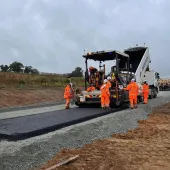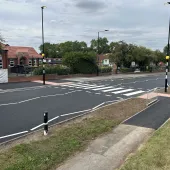Time running out for local road network

Potholes: 2017 could be potential ‘tipping point year’ warn councils in England and Wales
THE Local Government Association (LGA), which represents more than 370 councils in England and Wales, says the overall repair figure for potholes has been steadily growing. According to statistics from the Asphalt Industry Alliance’s annual ALARM survey, the total has risen from £9.8 billion in 2012 to £11.8 billion last year.
At this current rate, the repair figure is projected to rise to £14 billion by around 2019 – more than three times councils’ entire annual revenue spending on highways and transport (£4.4 billion), covering issues such as highways maintenance and the concessionary fares scheme for buses.
Meanwhile, the pothole repair time has surged from an estimated 10.9 years in 2006 to 14 years in 2016. Councils fix almost 2 million potholes a year – an average of 12,000 potholes for each local authority. Yet the average English authority currently faces a £69 million estimated one-time cost to bring its roads up to a reasonable condition.
To reverse this trend, the LGA is calling for the Government to inject a further £1 billion a year into roads maintenance. This, it says, could be achieved by investing just 2p per litre of existing fuel duty, though the Association stressed this should not be paid for by increasing fuel duty rates.
Previous LGA polling shows that 83% of the population would support a small amount of the existing billions paid to the Treasury each year in fuel duty being reinvested to help councils bring local roads up to scratch.
This would help tackle the damage done to these roads by recent harsh winters and decades of underfunding by successive governments, which has seen the national backlog of road repairs spiral.
The LGA points out that over the remaining years of the decade the Government will invest more than £1.1 million per mile in maintaining national roads – which make up just 3% of all roads. It says this level of investment contrasts starkly with the £27,000 per mile investment in maintaining local roads, which are controlled by councils and make up 97% of England’s road network.
This gulf in funding puts the country’s businesses at a competitive disadvantage and provides poor value for money, argues the LGA. It says virtually every ‘national’ journey starts and ends locally, which means the road network is not working for people in their corner of the country.
Councillor Martin Tett, transport spokesman for the LGA, said: ‘2017 could be a tipping point year regarding potholes, and councils who have experienced significant budget reductions now face the looming prospect of a bill of £14 billion to bring the nation’s roads up to scratch.
‘It is wrong and unfair that the Government allocates almost 40 times more to maintaining national roads, which it controls, compared with local roads, which are overseen by councils. It is paramount this funding discrepancy is swiftly plugged.’
Mr Tett continued: ‘It is becoming increasingly urgent to address the roads crisis we face as a nation. Councils fixed a pothole every 15 seconds again last year despite significant budget reductions leaving them with less to spend on repairing our crumbling roads.
‘Local authorities are proving remarkably efficient in how they use this diminishing funding pot but they remain trapped in a frustrating cycle that will only ever leave them able to patch up our deteriorating roads.
‘Councils share the frustration of motorists having to pay to drive on roads that are often inadequate. Our polling has shown that 83% of the population would support a small amount of the existing billions they pay the Treasury each year in fuel duty being reinvested to help councils bring our roads up to scratch.’
He added: ‘Our roads crisis is only going to get worse unless we address it as a national priority. The Government’s own traffic projections predict a potential increase in local traffic of up to 55% by 2040. Councils desperately need long-term and consistent funding to invest in the resurfacing projects that our road network desperately needs over the next decade.
‘Motorists pay billions to the Treasury each year in fuel duty when they fill up their car at the pumps only to then have to drive on roads that are decaying after decades of underfunding. They deserve roads fit for the 21st century,’ said Mr Tett.
Commenting on the LGA’s statement, Alan Mackenzie, chairman of the Asphalt Industry Alliance (AIA), said: ‘Prolonged under-investment, coupled with wetter winters, increased traffic and an ageing network, means that the resilience of our local roads is at a low point. Clearing the maintenance backlog is impossible without a significant increase in funding.
‘The fact remains that our local road network receives only a fraction of the funding allocated to the Strategic Road Network (SRN) and this disparity needs to be tackled proactively if further decline is to be prevented.
‘Reallocating a few pence from existing fuel duty might prove an equitable way of turning the tide, as could previous calls for Vehicle Excise Duty to be redirected to local roads from 2021. Either way, the LGA is right that time is running out and that local roads maintenance should now be a national priority.’









